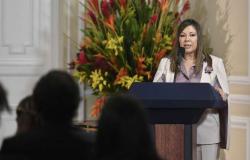
After the scandalous hearing led by the Legal Undersecretary of Human Capital and the social leader Juan Grabois, Room II of the Federal Chamber of Buenos Aires confirmed the decision of Judge Sebastián Casanello, who had ordered a plan for the immediate distribution of 5,000 tons of food who were under protection.
Furthermore, lThe judges criticized the behavior of the lawyer Leila Gianni and Grabois at Tuesday’s hearing.
Room II, made up of Martin Irurzun, Roberto Boico and Eduardo Farahsupported the precautionary measure signed by Judge Sebastián Casanello in the case that investigates dry food that was not being distributed to canteens and picnic areas.
The Ministry of Human Capital had appealed the measure, accusing the magistrate of “violating the division of powers”, exceeding his jurisdiction and ruling on a “non-justiciable State policy.”
None of these arguments were validated by the chamber members, who agreed with Casanello.
In his vote, the president of the Chamber Martín Irurzun stated: “The decision was adopted by a criminal judge within the framework of an ongoing case, which does notor it can be argued – as the appellant claims – that we are in the presence of undue interference of justice in spheres that are the exclusive jurisdiction of another State organ.”
Going deeper into this point, the waiter added: “State policies on food security are not under discussion but, plain and simple, If there was an illegal action by public officials “which further aggravated the catastrophic situation in which an important group of people finds themselves who do not have their basic human rights covered.”
For his part, Judge Farah referred to Tuesday’s hearing, which was marked by tension and insults exchanged between Grabois and the Human Capital official. “At the hearing held yesterday, the parties did not contribute anything to the solution of the case. Quite the opposite”.
The judge expanded on this idea by pointing out that the parties “did not fully explain the factual and legal reasons that supported their respective positions in the case. The few signs in that direction were diluted. On the one hand, andbetween insults, screams and mutual accusations about who is responsible for the situation of extreme poverty that plagues an important part of the population and about who should receive laurels for having effectively confronted that situation.”
On the other hand, Farah added, “between sermons, suspicions and even admonitions and advance scoldings slipped in for what they assume this Court will have to resolve”.
When referring to Casanello’s actions, questioned by the Ministry of Human Capital, the chambermaid said that the judge started from the basis of his criminal jurisdiction to investigation of reported crimes and the close relationship between this and the stored food that was not being delivered.
It was understood that the precautionary measure “placed emphasis on express provisions of one of the international treaties with constitutional hierarchy “which are applicable to the case because there is a significant poverty situation in the country and because the existence of numerous foodstuffs acquired and stored to be used to alleviate that situation has been demonstrated.”
Furthermore, in the ruling to which Clarion It was explained that Casanello “ordered something very different from that requested by the Prosecutor’s Office: did not order the “delivery of the food, but entrusted “the Ministry of Human Capital to, within the framework of its powers, Develop a distribution plann” of food stored in two warehouses.
This difference “reveals an attitude of prudence on the part of the trial judgewhich should be highlighted”
The judge also contributed his views Roberto Boico, who explained that contrary to what the portfolio led by Sandra Pettovello stated, the judge “did not tell the organization to proceed with the immediate delivery of the products to specific actors, but rather was asked to immediately present a plan containing the schedule to be executed.”
In this sense, Boico insisted, “the vehement statement is not true, even excessively adjectivethat the Judicial Branch of the Nation would be invading exclusive powers of the Executive Branch by attempting to implement State policies related to food distribution aimed at vulnerable groups.
He also took care to highlight the behavior of Leila Gianni and Juan Grabois during the hearing. The judge said in his vote: “The discussion that began with the appeal – replicated in the hearing held before this Chamber – followed a path that – unfortunately – has nothing to do with assistance, security or food policy, but rather with a closed defense by the body where The only thing that has been expressly made clear is that they will not comply with the court order”.





